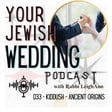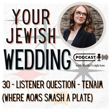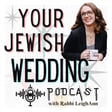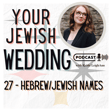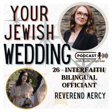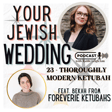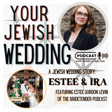
22 - Circling: Origins and Intercultural Connections
The traditional circling at a Jewish wedding has so much history and so many different meanings. As fun as its origins may be (you'll see!) I get most excited about how other cultures incorporate circling into their wedding ceremonies, too.
Please note: something went awry with the break music in editing. I don't really anticipate many, if any, of you caring. :)
Shownotes:
The first six minutes or so of this podcast are just me talking about the weather and scented candles.
~ 19 minutes: Kreissmesser article:
~
Don't forget - you can reach me (Rabbi LeighAnn) any time at www.yourohiorabbi.com or everyonesfavoriterabbi.com or rabbileighann.com !
Fill out the contact form there if you'd like to work with me on your wedding. There are SO many options, from Ketubah consulting to ceremony planning. If there's something you have in mind, don't hesitate to ask - I'm here to help!
IG: @yourohiorabbi
Podcast IG: @yourjewishweddingpodcast
Send questions for me to answer on this podcast to:
yourjewishweddingpodcast@gmail.com
Hope to see you next time! Remember - there is ALWAYS more learning to do!
<3 Rabbi LeighAnn
